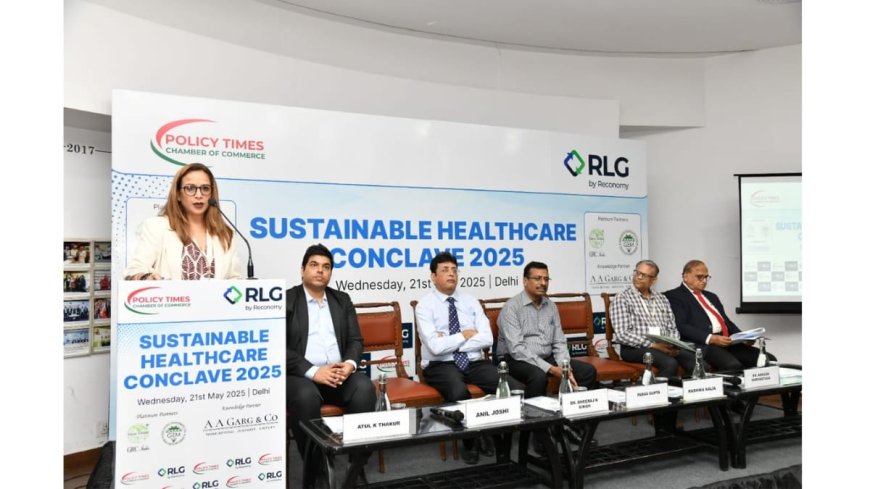Sustainable Healthcare Conclave 2025 Calls for Urgent Shift Towards Greener, Responsible Medical Systems
New Delhi [India], May 27: Today, when climate resilience and healthcare innovation are national imperatives, the Sustainable Healthcare Conclave 2025, held on 21 May at PHD House in Delhi, brought together leading voices from government, industry, and academia to chart a path forward for an environmentally responsible healthcare sector. Welcoming delegates, Ms. Radhika Kalia, Managing [...]


New Delhi [India], May 27: Today, when climate resilience and healthcare innovation are national imperatives, the Sustainable Healthcare Conclave 2025, held on 21 May at PHD House in Delhi, brought together leading voices from government, industry, and academia to chart a path forward for an environmentally responsible healthcare sector.
Welcoming delegates, Ms. Radhika Kalia, Managing Director of RLG Systems India, set the tone for the day with a compelling call to action. “We gather here at a crucial juncture, where healthcare and sustainability must walk hand in hand. Expanding care should not mean expanding our ecological crisis. Sustainability in healthcare is no longer optional, it is imperative,” she stated.
The conclave deliberated on the growing environmental impact of the healthcare sector, which contributes nearly 4–5% of global carbon emissions. From the growing burden of biomedical waste to Scope 3 emissions embedded in medical supply chains, the need for systemic transformation was a recurring theme across sessions.
Key Highlights from the Conclave Agenda:
1. Circular Economy in Healthcare
Experts highlighted strategies to embed circularity into the lifecycle of medical products—from design to disposal. Case studies on material reuse and recycling showcased tangible models for waste minimization.
2. Green Supply Chains
This session focused on reducing indirect emissions (Scope 3) through sustainable procurement, greener logistics, and data-driven compliance. Government representatives and corporate leaders exchanged insights on integrating ESG standards across health infrastructure.
3. Innovations in Biomedical Waste Management
Panelists discussed upgrading infrastructure to meet the Bio-Medical Waste Management Rules 2016, including the use of barcoding, GPS tracking, and real-time monitoring for waste transparency and safety.
4. Addressing Pharmaceutical Pollution
The final session examined how pharmaceutical residues impact ecosystems and water quality, with emphasis on green chemistry, wastewater treatment, and policy coherence with CPCB norms.

Policy & Innovation in Focus
In her keynote, Ms. Kalia highlighted India’s growing health investments, including a 9.46% rise in government healthcare funding for FY26 (₹96,000 crore), and the potential of AI to contribute up to $30 billion to GDP by 2025 through digital health platforms, diagnostics, and smart medical systems. However, she cautioned that without regulatory alignment, capacity building, and inclusive infrastructure, these advancements risk becoming uneven and unsustainable.
Global benchmarks were also discussed, with Germany’s integrated biomedical waste systems offered as a model for India to adapt—emphasizing automation, energy recovery, and circular integration.
RLG’s Perspective: Bridging Circularity and Healthcare
While the conclave remained non-commercial, it acknowledged efforts across sectors to foster circular practices. Notably, RLG Systems India’s Clean to Green campaign and contribution to India’s national Extended Producer Responsibility (EPR) Framework were recognized as models for cross-sectoral sustainability collaboration.
The Road Ahead
The conclave concluded with a shared vision: to build a healthcare ecosystem that heals without harm, innovates without waste, and grows without compromising the planet. Speakers called for multi-stakeholder coalitions, greater public-private cooperation, and rapid scaling of proven sustainability models.
With robust participation from regulatory bodies, hospital networks, pharmaceutical firms, waste management leaders, and technology innovators, the event underscored that the future of healthcare must be not only advanced, but accountable.
If you have any objection to this press release content, kindly contact [email protected] to notify us. We will respond and rectify the situation in the next 24 hours.







